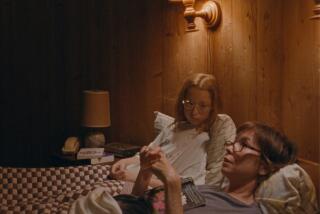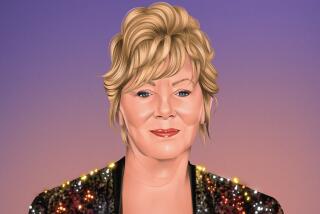Jean Baker Miller, 78; Challenged Psychological Views of Women
- Share via
Jean Baker Miller, a psychiatrist whose groundbreaking 1976 book “Toward a New Psychology of Women” identified as strengths many traits that had long been regarded as flaws in the mental and emotional makeup of women, died Saturday at her home in Brookline, Mass. She was 78 and had struggled for 13 years with emphysema and post-polio syndrome.
Her death was announced by Wellesley College, where Miller taught psychology and founded a training center that advances her theories about women and relationships.
Miller’s work awakened women involved in the feminist struggles of the 1970s to a new way of thinking about their abilities. Psychology, dominated by the Freudian model, had long portrayed women’s nurturing capacities as evidence of their dependency on others and ultimately of their inferiority. But Miller argued that those differences were an asset, not a deficit, and necessary for healthy psychological development regardless of gender.
Psychology Today, in a review of the 1987 second edition of “Toward a New Psychology of Women,” said that Miller “did nothing less than alter the course of gender psychology. She revealed women’s hidden strengths, renaming as valuable resources what were long considered weaknesses.”
Judith Jordan, a longtime colleague who directs the Jean Baker Miller Training Institute at Wellesley, said women often stopped Miller at conferences around the world to tell her how her book had affected them. “Everywhere we went women would come to Jean and say these identical words: ‘Your book changed my life. Thank you!’ Jean, with characteristic humility, was always surprised.”
Miller was born to a working-class family in the Bronx two years before the Great Depression. She contracted polio before she turned 1 and wore braces until she was 7. She had several operations that left her with a limp and an atrophied leg.
Her physical hardships, however, brought about a fortuitous encounter. During her twice-weekly hospital visits she met twin sisters who worked as nurses. They urged Miller’s mother to enroll her at a special women’s school, the Hunter College High School. Although it was an hour away by subway, her mother agreed to let her go. Miller flourished there and won a scholarship to Sarah Lawrence College, which was then for women only.
When she graduated in 1948, she noticed that most of her classmates could find only clerical jobs. Miller wanted a job that would enable her not only to support herself but to help other people. She decided to pursue medicine and entered the College of Physicians and Surgeons at Columbia University, where she was one of 10 women in a class of 100.
After earning her medical degree in 1952, she stayed in New York to complete psychiatric residencies at the Bellevue Medical Center, the Albert Einstein College of Medicine and the Upstate Medical Center. She then undertook psychoanalytic training at New York Medical College and went into private practice.
According to Jordan, who knew her for 30 years, the experience of being a woman in a male-dominated field helped lead Miller to a paradigm shift in the psychological understanding of women. Once she entered psychiatry, she became convinced that “a lot of what was written about women was just completely wrong,” Jordan said.
“ ‘We haven’t listened to the voices of women,’ that was her phrase,” Jordan said in an interview Thursday. Miller edited a collection of essays called “Psychoanalysis and Women,” published in 1973. It was a major contribution to a growing dialogue about fallacies and flaws in the psychoanalytic view of women.
By then she was an avid participant in consciousness-raising groups, in which her intimate conversations with other women helped her form a new vocabulary for describing the female psyche. She began to use words like “connection,” “caring” and “relationship” instead of the more negative “dependency,” “manipulation” and “fusion.”
Three years later, she published “Toward a New Psychology of Women.” It became a bestseller, translated into more than 20 languages, that helped to establish Miller as a pioneer in what became known as relational psychology, which defines mental health in terms of emotional connections to, rather than separation from, other people.
“Women are quite validly seeking something more complete than autonomy as it is defined for men,” she wrote, “a fuller not lesser ability to encompass relationships to others, simultaneously with the fullest development of oneself.”
In the late 1970s she joined a group of female psychotherapists who were as disenchanted as she was with the patriarchal ideas that had shaped psychology. The other members included Jordan and Irene P. Stiver, then a senior psychologist at McLean Hospital, an eminent psychiatric hospital affiliated with Harvard Medical School. It was an informal but intense forum for developing alternatives to the male-oriented autonomy-separation model of psychological maturity.
Miller later collaborated with Stiver on “The Healing Connection,” published in 1997. It drew upon work they and their colleagues conducted on the treatment and prevention of women’s mental health problems at Wellesley’s Stone Center for Developmental Studies, where Miller was director in the 1980s.
In 1995, Wellesley established the Jean Baker Miller Training Institute, which instructs therapists and others in relational theory. Miller was the director until late last year.
Miller is survived by her husband of more than 50 years, S.M. “Mike” Miller; two sons; and a grandson.







